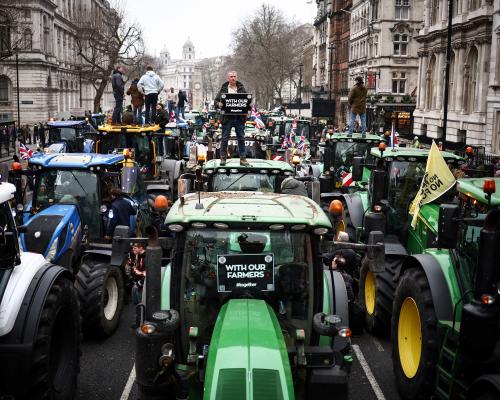
The National Farmers’ Union (NFU) has called for a meeting with Rachel Reeves to discuss changes to Labour’s inheritance tax reforms after fresh evidence from tax experts that the planned changes may not achieve their stated goal of removing the incentive for rich people to shelter their wealth from tax by buying up farmland.
The chancellor’s plan, which comes into force next April, “largely protects family farms whilst limiting claims by the wealthiest estates”, according to a report by researchers at the Centre for the Analysis of Taxation (CenTax), which has proposed amendments to the inheritance tax changes.
However, Dr Andy Summers, the director of CenTax and an associate professor at the London School of Economics, said: “The relief could be better targeted to reduce its use for tax planning and further extend protection for businesses, including farms.”
The chancellor’s announcement in last October’s budget that she was bringing farms and other agricultural property into inheritance tax rules to raise money for public services and close a tax loophole exploited by some wealthy landowners sparked uproar.
Farmers responded with large-scale protests and drowned out ministers’ speeches with tractor horns after Reeves said she was ending a decades-long exemption for farms and would make inheritors pay 20% of the value of agricultural and business property above £1m.
In an average year, the vast majority (86%) of farm estates affected by the inheritance tax changes could pay the entire tax bill using non-farm assets, the CenTax analysis found, leaving 70 estates out of 1,560 farms which could not.
The NFU has repeatedly voiced its opposition, warning of threats to the UK’s family farms and the nation’s food security.
However, the NFU’s president, Tom Bradshaw, told the Guardian he welcomed the CenTax report and called on the chancellor and her officials to discuss the findings before April.
“This report gives us an opportunity to sit around the table and try to adjust the recommendations that have been made so far to target them better and remove the worst of the impact from the working family farms,” he said.
“I really worry about the period through the autumn and the winter ahead of April, and we’ve got to try to get changes in place that mitigate the impact, but still meet Treasury requirements.”
CenTax’s analysis also found that landowners are less likely to be affected by the tax reforms than working farmers, as they represent almost two-thirds (64%) of all farm estates but only 42% of affected farm estates.
It also found that owner-farmers account for 17% of all farm estates, but more than a third (37%) of affected farm estates.
Bradshaw said this showed wealthy landowners “can afford to pay the tax without having to sell assets, whereas a much greater percentage of family farms will have to sell assets or sell part of the farm to pay the inheritance tax”.
“If it forces the sale of some farmland, it may well mean that the farm is no longer viable, it will reduce the ability to continue producing food,” he said.
It came as Reeves said decisions around taxes would not be announced until the autumn budget, after the Guardian reported that she was looking at ways to raise more money from inheritance tax amid growing pressure on the UK’s finances.
The chancellor told reporters on Thursday that decisions would be made “in the round” and the key focus of the budget would be to “boost productivity and growth and prosperity all across the country”.






